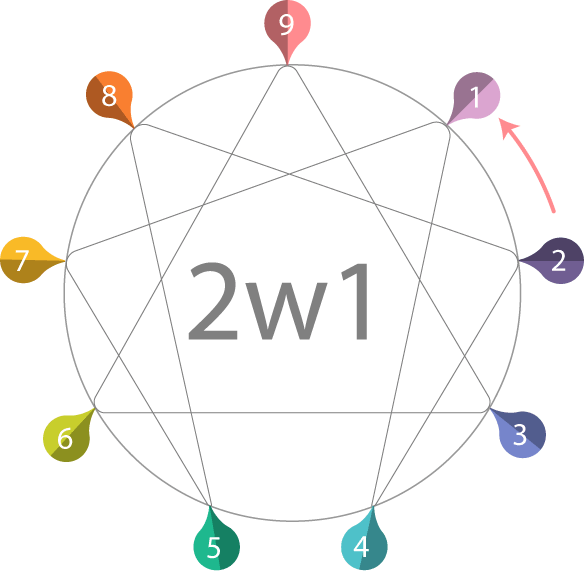You Are Most Like Type:
2 Wing 1 “THE SERVANT”
Have you ever found yourself tirelessly attending to others' needs, yet feeling unappreciated or overlooked? Do you strive for perfection, only to encounter burnout and self-criticism? If these scenarios resonate with you, you might identify with the Enneagram 2w1, "The Servant". As a 2w1, your compassion and desire to help, are guided by a strong moral compass, driving you to make a positive impact in the lives of those around you.

However, this admirable combination can also present challenges. You may find yourself overcommitting, taking on too many responsibilities, leading to stress and exhaustion. Additionally, your high standards might cause you to be overly critical of yourself, exacerbating feelings of inadequacy.
Your inclination to prioritize others can result in neglecting your own needs, as you might struggle to set boundaries or express your desires. This self-neglect can lead to resentment, especially if your efforts are unrecognized.
OVERVIEW
Distinctive Characteristics:
Compassionate Idealism
As a 2w1, your personality is a beautiful blend of Type 2’s nurturing heart and Type 1’s principled mind. This means you’re not just driven to help—you’re driven to help with purpose. You’re the person who volunteers at a food bank, not only to feed the hungry but also to ensure the process is efficient and dignified for everyone involved. Your actions are heartfelt, but they’re also guided by a strong ethical compass, making your care both intentional and impactful.
Desire for Excellence in Service
Helping isn’t just about showing up for you—it’s about doing it right. You strive to meet others’ needs with precision and correctness. Picture yourself planning a charity fundraiser: you wouldn’t just throw together an event; you’d ensure every detail reflects the cause’s importance, from the color scheme to the guest list. This makes you highly reliable, but it can also mean you’re a little hard on yourself when things don’t go perfectly. Unlike a more flexible 2w3, who might prioritize efficiency or charm, you’re focused on making sure your efforts align with your values and truly make a difference.
Inner Conflict Between Duty & Connection
Here’s where things get a little tricky. Your Type 1 wing brings a strong sense of duty, while your core Type 2 craves emotional closeness. This can create moments of tension—like when you’re torn between staying late to perfect a project at work or going home to spend quality time with a friend who needs you. It’s a delicate balance between striving for idealism and being fully present in your relationships. But this dynamic also gives you depth, making you both structured and deeply caring.
BASIC FEAR
Not feeling loved and they constantly honor whom they love.
Although they reject affection—in a thousand different ways—they need to feel loved back. They build security by serving others and being worthy of love. The 2W1 is a skilled reader of other people’s feelings. As they scan others, they feel compelled to satisfy them while not forgetting their own feelings. This type can be an important backbone in both relationships and conflicts, so it’s important to show them gratitude and attention.
BASIC DESIRE
To to be loved, to feel accepted and surrounded by affection.
Life is intense and full of ups and downs, and everybody deals with it and goes through the pain in different ways. However, if they could, Enneagram type 2 wing 1s would save those dark hours for you. They know how it feels, and their concern comes from their strong empathy. They end up loving others in an unconditional way as they should love themselves. That’s why there are so many expectations in relationships.
Your Superpowers:
-
Empathetic & Principled
You have a unique gift for combining deep compassion with a strong sense of ethics. People can rely on you because your care comes from the heart, and your actions are always thoughtful and sincere. Whether it’s supporting a friend through a tough time or standing up for what’s right, your kindness is grounded in integrity. -
Selfless and Responsible
Your Type 1 wing gives you a strong sense of duty, enhancing your natural caregiving tendencies. You go above and beyond to support your loved ones. You don’t just do what’s needed—you make sure it’s done well. -
Supportive and Fair
Your warmth is paired with a clear sense of fairness, which allows you to uplift others in ways that feel just and balanced. You bring harmony to your relationships by being both emotionally available and grounded in your principles.
Challenges Ahead:
-
Perfectionism in Helping
You have high expectations for yourself and others when it comes to giving support. If your efforts to help aren’t perfect or go unappreciated, it can leave you feeling frustrated and stressed. This inner critic can lead you to place unnecessary pressure on yourself, making it hard to celebrate the good you’ve already done. -
Suppressing Personal Needs
Your desire to put others first is admirable, but it often comes at the expense of your own well-being. Taking time for yourself might feel selfish, but the truth is, neglecting your needs can lead to burnout. Learning to prioritize your desires and set boundaries can help you avoid emotional exhaustion while still being there for others. -
Fear of Being Unworthy
Sometimes, you might feel like your value is tied to how much you help others. You may worry that if you’re not “useful,” you’re not enough. This drive for validation can make it hard to see your own intrinsic worth. Recognizing that you are valuable simply for who you are—not just what you give—can be a powerful step toward self-acceptance.
Inside the Mind of a Servant: How 2w1s Process the World
As a 2w1, your thoughts are a blend of love and responsibility. You’re always considering how you can support and care for others while staying aligned with your own high moral standards. Helping isn’t just something you do—it’s part of who you are.
You think about practical and meaningful ways to meet people’s needs, always striving to make a genuine impact. At the same time, you want your efforts to be valued, and you feel sure about doing things the “right” way. The balance between those two sides can sometimes create stress, especially when you feel unacknowledged or see others not living up to their potential.
Your 1 wing brings a disciplined, perfectionistic edge to your thinking, which can make you overly critical of yourself and others when things don’t go as planned.

Heart First:
The 2w1 Approach to Love
You show your affection through acts of care and service, always looking for ways to support your partner in meaningful ways. Whether it’s remembering the small details that matter to them or stepping up to help when they’re overwhelmed, your love is expressed through both emotional warmth and practical actions.
In relationships, you’re often the one who notices unspoken needs and steps in to fulfill them. For example, if your partner is feeling stressed about a work deadline, you might cook their favorite meal or help them organize their tasks. Your 1 wing ensures that your efforts are not only loving but also thoughtful and intentional—you don’t just want to help; you want to help in a way that truly makes a difference.
However, your high standards and sense of duty can sometimes lead to challenges. You might feel frustrated if your efforts aren’t acknowledged or if you sense your partner isn’t putting in the same level of care. Your strong moral compass might also make you more critical, expecting both yourself and your partner to meet certain ideals.
Your natural tendency to prioritize your partner’s needs can sometimes mean putting your own on the back burner. For instance, you might hesitate to ask for support when you’re struggling, fearing it might disrupt the harmony of the relationship. Learning to communicate your own needs openly and practicing self-care can help you maintain balance and avoid feelings of burnout or resentment.
How a 2w1 Navigates Relationships:
You bring a unique balance of empathy and principle to your social connections, whether you’re at work, a party, or a family gathering. Your natural tendency is to notice what others need and offer support in thoughtful and practical ways, often going above and beyond to make people feel cared for.
At a party, you’re likely the person checking in with the host to see if they need help refilling drinks or tidying up. If you notice someone standing alone, you’ll engage them in conversation, ensuring they feel included. Your kindness is genuine, but your principled side might kick in if you see something unfair or inappropriate—like someone being left out of a group. In those moments, you’ll find a tactful way to redirect the situation, balancing your care for others with your moral compass.
During a family reunion, you’re the one making sure everyone feels welcome and supported. You might help an elderly relative get a plate of food or take the time to listen to a younger family member talk about their latest achievements.Your attention helps create a harmonious environment, though you may sometimes overextend yourself, juggling too many responsibilities and neglecting your own needs.
Personal Growth Tips:
2w1
EMBRACE IMPERFECTION IN HELPING OTHERS
As a 2w1, your desire to help can sometimes be paired with a need to do it perfectly—but here’s the thing: it doesn’t have to be flawless to be meaningful. Helping isn’t about fixing everything; it’s about being present and supportive.
PRIORITIZE SELF-CARE WITHOUT GUILT
Putting others first is your default, but don’t forget—you matter too. Taking time for yourself isn’t selfish; it’s essential. Whether it’s a quiet walk, a hobby you love, or simply resting, self-care helps you recharge so you can show up fully for others without running on empty.
ACKNOWLEDGE & EXPRESS YOUR NEEDS
You’re great at connecting with others, but what about your own needs? Practice speaking up about what you feel and want. Open communication strengthens your relationships and helps create a balance where both feel genuinely connected and supported.
LET GO OF OVER-RESPONSIBILITY
It’s okay to share the load. Your sense of duty might make you feel like you have to do it all, but delegating or letting others step up is just as valuable. Trusting others to handle their responsibilities eases your stress and gives you room to focus on what truly matters to you.
FOCUS ON INTERNAL VALIDATION
Your 1 wing’s push for improvement is admirable, but don’t let your worth depend on others’ recognition. Celebrate the love and care you give, knowing that your value comes from who you are, not just from external approval. This mindset builds confidence and strengthens your sense of self.
Key Differences Between:
2w1 and 2w3
- Focus: You, as a 2w1, are driven by internal principles and a sense of duty, while a 2w3 is more motivated by external recognition and relational success.
- Approach to Relationships: Your approach is thoughtful and dependable, prioritizing depth and harmony. The 2w3, on the other hand, thrives on charm and adaptability, building vibrant and engaging connections.
- Emotional Style: You tend to be reserved and morally grounded, while the 2w3 is more expressive and socially confident.
- Mother Teresa
- Samwise Gamgee (The Lord of the Rings)
- Marge Simpson (The Simpsons)
- Anna (Frozen)
- Jane Eyre
Famous Characters
2w1s